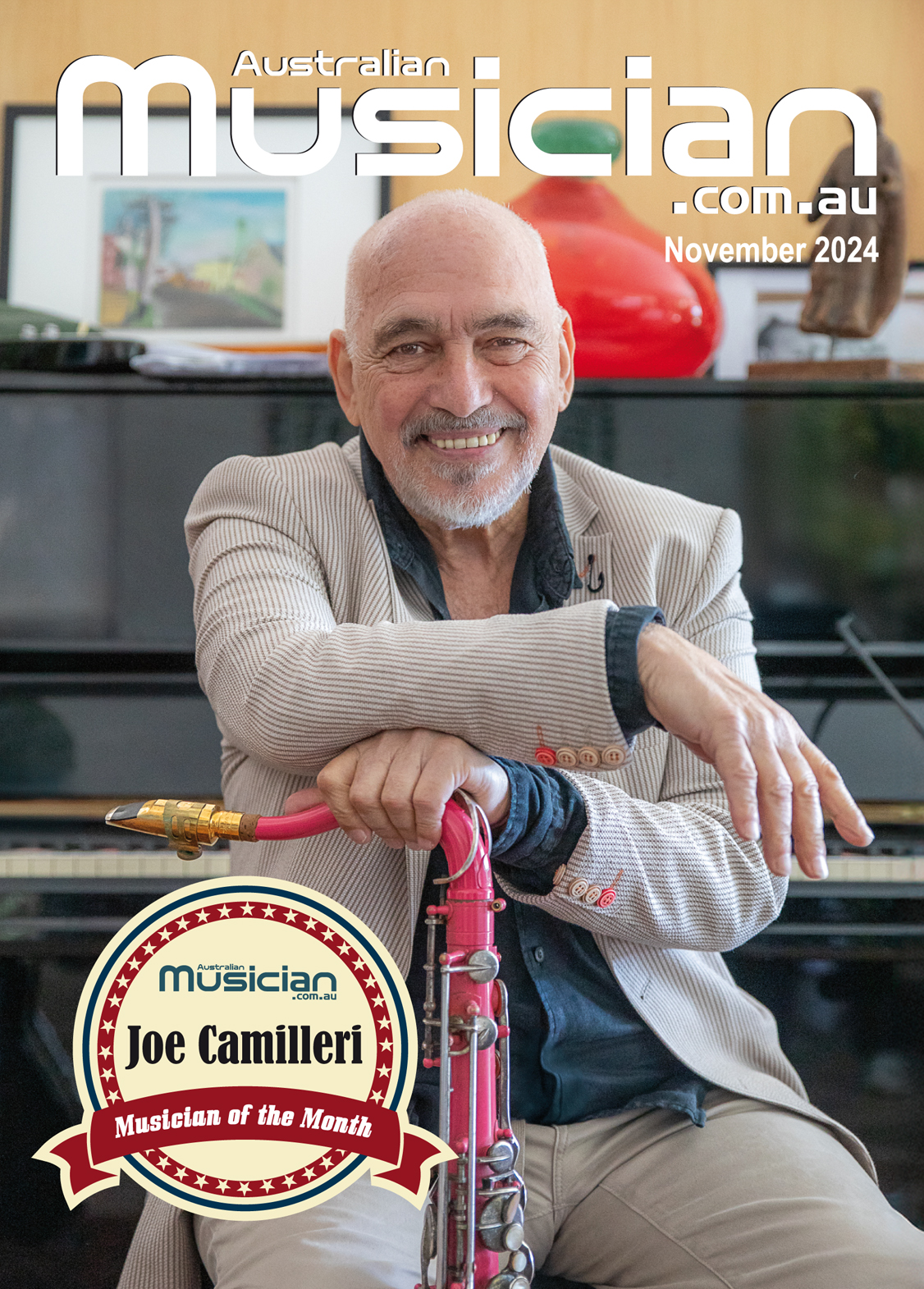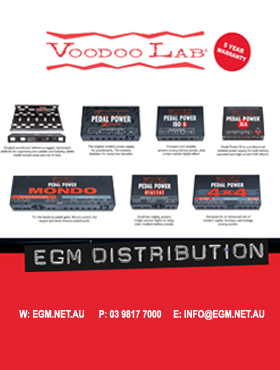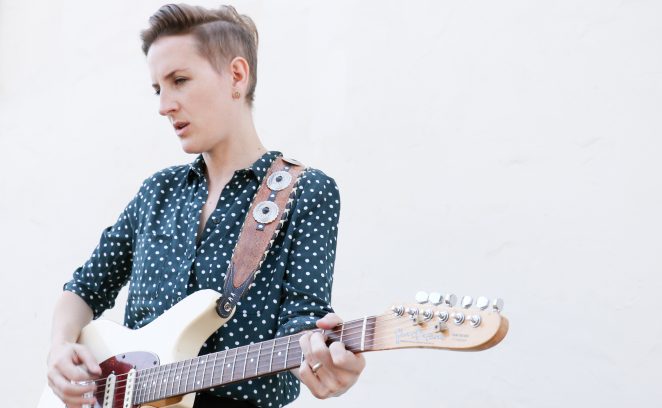
Much like a home cooked meal composed of whatever ingredients were on hand, a mix of staples and some from unlabelled containers, Mia Dyson has uninhibitedly brewed a mighty rich, vibrant and soulful concoction of an album she’s titled If I Said Only So Far I Take It Back. With the luxury of three weeks recording time and the assistance of longtime collaborator Erin Sydney, as well as Alabama Shakes’ keyboard player Ben Tanner co-producing, together they’ve created a record that Mia can truly be proud of. Known for her roots-flavoured melodies, on the new album Dyson hasn’t been afraid to tap deep into her influences, breaking into pop music hooks one moment and exploring weird and wonderful atmospheric textures and beats the next. It’s no secret that Mia, daughter of respected Australian guitar maker Jim Dyson is a fine exponent of the fretted instrument but Tanner has been savvy enough to recognise her vocal ability too and has left a perfect amount of space in the mix for her emotive and quite powerful vocal takes. To make the album, Mia headed down south from her LA base and shacked up in the historic music town of Muscle Shoals, recording in a building famous for producing albums by Bob Dylan, Joe Cocker and Steve Winwood, records that had been infused into her DNA as a child. Completing the romantic picture, Mia was armed with pages of wonderful lyrics penned by her husband, whom she’d only recently discovered was a talented poet. Mia releases the new record on Friday March 9th and follows up with a short Australian tour beginning in Melbourne on March 23rd.
Ahead of the album release and tour Mia spoke to Australian Musician editor Greg Phillips about the creation of If I Said Only So Far I Take It Back
Mia, you’ve lived in LA for 6 years now. How have you adjusted to LA life?
When I first moved over, it was to Boston and it was a very different experience. I loved it but then I moved to LA after about 9 months. LA … I took to really quickly. I love the people, it’s a very vibrant place. It gets a bad rap. I mean Hollywood is very ugly and all the tourist places are not very fun but to live here is a very different experience. I live in a neighbourhood which is very hilly with beautiful bougainvillea everywhere and Spanish architecture. I can walk to places, which people don’t believe you can do in LA. I feel inspired by the energy here.
Were the songs from the new album all written in LA?
Yeah pretty much. I don’t write on the road, I just find it very difficult. I have tried it and it didn’t work. I need peace and quiet and to be home to do that. The big difference with this album is that I wrote all of these songs with my husband, who I only discovered a few years ago that we could write together. I’d never really found anyone that I had that synergy with when I’d tried co-writing before. I’d do it for the experiment of it all. People would ask me and I’d give it a go but all of my albums are songs I’ve written by myself up to this point. I just fell in love with writing with him. He’s always written poetry, so he comes from a lyrical background I guess you’d call it. We just have this thing and it is so great for our relationship. He’s so … for want of a better word … poetic and I am more direct in our writing styles. I continue to do the music side of it but we work on the lyrics together which has become a dream come true that I didn’t know I had. Actually come to think of it, some of the songs were written in an RV. We’d take this old RV up into the mountains and write together so not all in LA. Just for factual clarity.
I believe it took a while for you to discover that your husband had these lyrical skills?
Yes it did. He had told me that he had written poetry in the past but wasn’t forthcoming in showing me anything until maybe a few years into our relationship. I guess a few years in, he started writing a lot of poetry again, probably when we were back in Australia. He just had this outpouring and I loved his poems. I tried to put one to music for my own amusement because I thought it would be interesting and I loved what it inspired in me. First of all I think we tried to finish a song I had started with one of his poems but it’s often the case that I can only grab a couple of lines. The poetry form is so different and often they don’t rhyme … which is great too, sometimes I love not rhyming … so a lot of times I would take just a few lines and take it somewhere else. Then we said, why don’t we try writing lyrically from scratch and that was a beautiful experience too.
Tell me about the album title, ‘If I Said Only So Far I Take It Back’. What’s the story behind that?
It comes from one of the songs which is called Open and it is the first line of that song. The whole song is about … everywhere that I have held myself back or set a limitation or decided that I could do nor more or go no further or that was the limit of my courage, it’s like a call to myself to go beyond that. So If I said only so far, I take it back. Of course I never live by that 100 percent but that’s the call I am making … with a lot of this album.
Before making the album was there a specific plan in regard to the album’s sound?
Actually no. In fact more than any other record, I left a lot of those decisions until the studio. I was collaborating with my longtime drummer Erin Sydney, who also co produced but we went to Muscle Shoals to work with Ben Tanner (Alabama Shakes) who co-produced as well. Because we didn’t get to spend time with Ben in advance, Syd and I were rehearsing stuff up but we didn’t want to get fixed on too many ideas. We wanted Ben to have some input into how it went in the studio. We tried not to get too attached to any arrangements. We made the songs as good as they could be but left more the sonic and arrangement ideas a little open so that we could try and experiment in the studio. The studios down there in Muscle Shoals are so inexpensive that we were able to do about 3 weeks, whereas every other record I have made has been in 7 days or less. So it was really fun to not have the pressure of ok, we just have to get it done. It was really cool to elaborately experiment with guitar sounds and finding a different tone and approach for each song. If a song wasn’t working on a day we were able to go, ok let’s shelve it today and come back to it. There was room to move, which was a beautiful luxury.
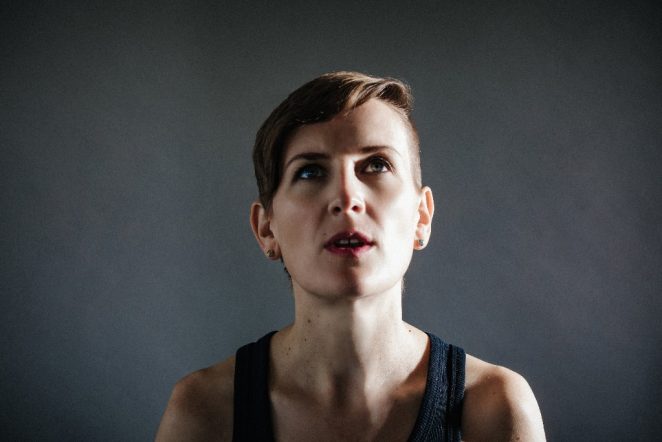
Did recording in Muscle Shoals have a psychological or emotional effect on you?
I think so, it was a very special time and experience for me. I had already been down there to meet Ben and also John Paul White, who was originally going to be more involved, he was my connection to Muscle Shoals. I just fell in love with the place. John took me to tour all of the studios like Fame and Muscle Shoals Sound. I grew up listening to the records from Muscle Shoals and knowing about Muscle Shoals even before I knew where in the world it was … it was this mythological place for me as a kid. My dad played those records and was so into the history. It’s on this huge Tennessee river … it’s very beautiful but very depressed and poor away from the big cities and it’s very southern and I am drawn to that music. It was fascinating and inspiring and exciting to put my toe in the historical waters of everything I grew up listening to and the whole reason I got into music.
You had David Hood (Traffic, Boz Scaggs, Paul Simon) playing bass on the album. Do you give someone like David a brief on what you want or just let him do his thing?
That’s such an interesting question. Ben Tanner was the one who got David onboard. Obviously I was thrilled to have David but I’d never met him. We were just going to go into the studio and as much as I trusted Ben, it is still a scary experience and you go … ok I hope it works! David had this really interesting way of working, he kind of charted out the songs beforehand from our demos. It would feel really weird for the first couple of run throughs and I was like … oh! Then something would happen where he would find his thing. We’d be like ok, let’s run through it again, no pressure. He has this amazing ability to play the most simple thing and just ground it and I’d think, what is he doing? How can that be so cool when I can’t really tell what’s happening. If I listen to it on it’s own, it seems like nothing special is going on but when it’s all together, he’s just got that musical thing, that magical thing that is hard to put your finger on. He was so fun to work with, he’s a very humble, sweet guy, super cool. We loved hearing his stories but we had to coax them out of him, he’s not one to say, you know, let me tell you about …
Tell me about the guitars you used on the album.
Well I would except that I don’t remember half of them. I know I played this really old Tele, it had such a big, broad, bright sound. I don’t know what year it was. The funny thing is that my dad makes guitars and I’ve always played his and played it on this record too but because I have been spoiled for never having to go into a guitar shop and try to figure out what’s a good guitar, I am not super knowledgable about guitars. Dad’s guitars have very rich and full tones and I love that but there’s this whole world of less ‘nice’ sounds that we explore on the this record including using a fuzz pedal for a couple of songs which was really fun. But we’d try two amps and some chorus from an old chorus pedal, a few Teles a Harmony and that’s about as much as I can remember.
There are moments on the album where you wonder what’s being used to create the sounds, like at the end of the track Beloved. It seems like there might have been a bit of experimentation to get some sounds down …
Yeah that song and another one, ‘Gambling’ … we played all of them as a trio live and mostly that was the basic track that we used except for Beloved. We tried it with real drums and it became apparent that it needed some electronic drums, so we started experimenting with that. We’d record something and then loop it and added an electronic sound over the top. That was all territory that in my twenties I’d be like, oh I would never do that. It was taboo, coming from the background that I had. I just love it. My tastes and my desire to experiment has really expanded. So you’ll definitely hear some synth on there and electronic sounds that I won’t be able to create live unless I get a synth player … which you know… maybe in the future I would. When I was recording, I didn’t worry too much about … oh, how am I going to recreate this live? We did experiment though and we threw a bunch of stuff out, things that we didn’t need to keep. Again that was the luxury of having the time but we still had to keep to a schedule. There was time to go down a rabbit hole for two hours and see if we get anywhere and I loved doing that. Between Beloved and Gambling, there’s a combination of played guitars and electronic keyboard sounds that you can’t really differentiate what is what.
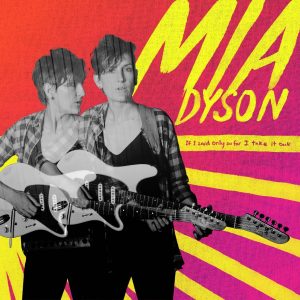 The opening track, Being Scared has a really cool low-fi acoustic guitar sound on it. How did you achieve that sound?
The opening track, Being Scared has a really cool low-fi acoustic guitar sound on it. How did you achieve that sound?
That was the shittiest guitar. It was a Fender nylon string I bought for playing at home. It’s a 3/4 size because I don’t like that nylon strings have the really fat neck. This one has a thin neck like an electric guitar and it was a hundred bucks and it goes out of tune easily but I liked the sound of it. We just miked it up with a couple of different mics and it was surprising to me that it ended up being the first track.
Your album is out March 9, then you have an Australian tour in March. Then what?
Then we have another tour of the States in April and then plans aren’t confirmed but I’ll be back in Australia toward the end of the year. The March tour is quite brief, so I want to come back again and do a longer tour.

